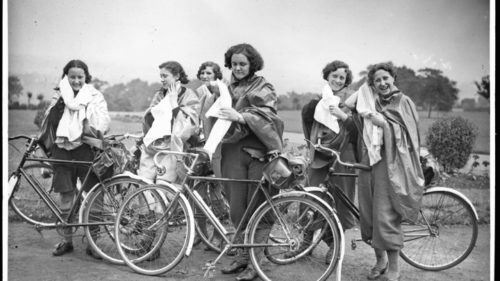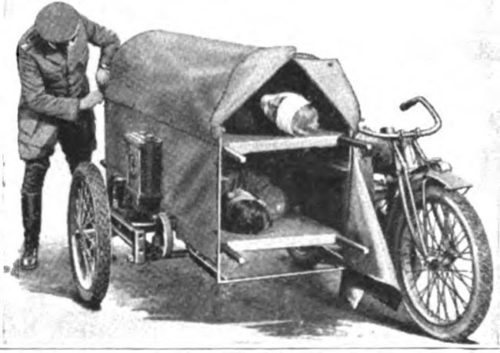
The prosperity of cities and countryside of the late 1940s England, France, Italy, etc. benefited significantly from inexpensive and “off-grid” two-wheeled technology — these economies all were rebuilt on bicycles.
When I lived in London in the 1990s and studied post-WWII History, I regularly noticed this kind of footnote (pun not intended) on two-wheeled transportation for much of Europe.
My curiosity in European cycling might have been a bit biased, as I myself rode a bicycle everywhere and everyday (spinning through the dark rainy days along dirty double-decker red buses, black cabs and the anti-terror Ring of steel that obfuscated downtown London).
It wasn’t just a link with history. The math of cycling appealed to me: A car at that time would have taken at least 30 minutes plus parking time for me to go from home to the city. I could ride a bus for 45 minutes plus waiting, take the train for 30 minutes plus waiting, or… I could go door-to-door on a bike in just 20 minutes.
Besides saving money, the time I saved on a bicycle made the choice obvious (I have to admit I did not properly account for the pollution/health costs caused by lax vehicle emission laws).
Despite these simple calculations, I usually found at all times I was the only cyclist on any London roads.
It seemed odd to not see others on bikes especially since London had been through a period of extremely popular two-wheel transportation use in the past that had proved their value.
Take for example this video of the Cyclist Touring Club from Britain, which talks of “rediscovering common humanity” and “getting rid of our enemies” in the 1950s:
Another good example is the light scooter industry of Italy — a result of the war industry. While bicycles were obviously popular, after 1945 the prevalence of metal tubes (frame), wheels, tires and sheet metal manufacturing for Axis war planes was re-purposed into two-wheeled transportation. It all started with the single model motor scooter in 1946 by Piaggio & Co. SpA of Pontedera, Italy
I won’t go into why people moved away from these logical options for transportation and to the illogical gasoline automobile. Kunstler does a good job of that in The Geography of Nowhere. Instead, I want to point out here that the recent tsunami devastation in Japan is showing a sudden uptick in two-wheeled commuters.
The disruption of centralized fuel sources, coupled with the unreliability of roads and rails, makes bicycles an obvious best choice for transportation. Rather than walk from the city to the suburbs workers are driving up demand for efficient yet fast transportation on two-wheels.
Bicycles sold like hotcakes at supermarkets and bike shops after Friday’s megaquake shut down train services in the Tokyo metropolitan area, attracting local residents — and people from farther afield — who wanted to cycle home instead of facing the prospect of walking for several hours.
Disaster planners should not underestimate the importance and resilience of two-wheel transportation (and power generation), especially given recent advances in motorcycle ambulances in Africa that greatly reduce mortality rates.

A bicycle ride to a data center, office or even a hospital might seem ridiculous until you take a good look at these disasters and factor transportation dependencies. The next days and weeks unfortunately will illustrate the automobile infrastructure weakness as well as how gasoline hoarding by automobile owners can negatively impact recovery.
The growth of automobiles always has been based on questionable assumptions about the government’s ability to collect taxes in order to protect and provide smooth highways, right-of-way, and inexpensive fuel. A national disaster puts these assumptions in a very different light. It shifts the economic playing field and puts the automobile back into its more natural disadvantaged state.
The biggest irony of this all, perhaps, is how often I find avowed libertarians driving exactly the kind of inefficient cars that depend heavily on the commonality of infrastructure and centralized services — only after a national disaster do they realize that a gas-guzzling shiny and fragile “success-mobile” is the ultimate sign of their unsustainable yet socialist tendencies.